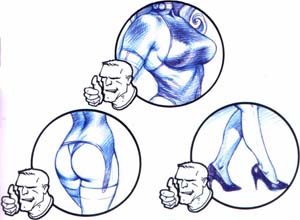For those just tuning in, this is Part 3 of my series on a small blurb that Joseph Lisner wrote for Wizard’s “How to Draw” series (found here [JPG]).
The language Lisner uses throughout the blurb Others, dehumanizes, and ultimately objectifies the women that he’s talking about — both drawn and real. The chart below compares the language he uses to describe women versus the language he uses to describe men. In terms of variation of terms it was equal (4 on 4), but the distribution of those terms reinforces the general message being sent in the blurb — men as people, women as objects.
| Term |
# of Uses |
Term |
# of Uses |
| Women |
2 |
Men |
4 |
| Female |
4 |
Male |
1 |
| Girls |
1 |
Guy |
2 |
| Ladies |
1 |
Gentlemen |
1 |
Lisner uses “female” the most to describe women and “men” the most to describe men. In fact, the one use of “male” is a correct usage of the term, while most of the way he uses “female” are inappropriate outside of a nature documentary or science lab. Before I get into the nitty gritty, however, let me first explain the differences between “female”/”male” and “woman”/”man”.
I. Adjectives Versus Nouns
“Male”/”female” are most commonly used as adjectives used to list characteristics or otherwise modify nouns. In the former case, since the nouns being modified are inherently gender neutral, it can be useful to specify a gender if one wants to address that section as a whole. Some examples include “female gamer,” “male doctor,” “female teacher”, and “male artist”. There are also times when the noun is implied, rather than stated. When you say, “I am female,” you are stating a characteristic like saying, “I am tall.”
These terms can be used as nouns, but this is typically confined to scientific settings. In nature documentaries, for example, you will see this employed to talk about the animals (“the male sleeps peacefully,” or “the female leads her pack on the hunt”). For reasons I will get into below, however, this use of the term is, if not incorrect, then certainly sexist outside of a scientific setting.
The terms women, girls, men, boys are all nouns used to describe types of humans. You use them when you want to specifically address one kind of human: “Girls and boys go to school,” or “Let’s join that group of men over there.” Using nouns is the typical way to distinguish between genders.
II. Why It Matters
You wouldn’t typicaly say “I am a female,” (you are a female what? person? bat? fruitfly?) but rather “I am a woman,” and not just because it’s grammatically ambiguous. There’s a reason why, outside of a scientific arena, we don’t commonly refer to people as “the male” or “the female” — it’s dehumanizing. Because the most common usage of “female” and “male” are as adjectives, using them as nouns serves to remove the human element (ala. “the gay”, “the black”, “the transsexual”). With “male” and “female”, this is further reinforced by the setting we do see the words used as nouns in, which is to say in reference to animals.
III. The Terms In Action
Lisner illustrates this dehumanization process perfectly. Men, to him, are clearly people and so his most common reference to them is as “men” (or “guys”, which is also a noun). The one instance in which he uses male, he uses it as an adjective describing himself (“heterosexual male”).
Let’s contrast this to the way that he described women.
Anyone attracted to the female must ask themselves, “What turns me on? What about the opposite sex hits me like lightning and instantly shatters my self control?”
His language here is reminicent of a documentary, “The wild males of the flock are attracted to the female, but which one shall be her mate?” So, already, we have the animal connotations. It’s also important that the concept of woman is important here only in terms of facilitating men’s lust: “the female” is the vehicle in which men are turned on, important because some effusive quality of this concept of “the female” is so powerful that it “instantly shatters [men’s] self control.” The actual woman here is non-existent, and ultimately not important.
Many is the time I have been out with a girlfriend and some female would walk by and totally blow my mind.
Again, here we have the use of female as a noun. This is dehumanizing on two levels.
First, the use of “some”. We use “some person” to mark the information as unimportant (A: “Who was at the door?” B: “Oh, it was just some guy.”)– it wasn’t a person, it was some person. Not always, but often, its used with negative connotations: “Jeez, some guy just ran the red!” or “Some person’s cell phone went off in the middle of the movie!” or “Some woman was yelling so loud I could hear her in my room.” Writing this, I am also struck by the way that “some man” doesn’t seem natural to me. “Some boy,” sure. “Some guy,” okay. “Some dude,” even. But “some man” hasn’t, in my experience, been a phrase that has gotten a lot of play. I’m not entirely sure why.
Anyway, the second way that it’s dehumanizing is in the same way “the female” above is dehumanizing: it reduces the woman in question to an object of Lisner’s lust. He reinforces this opinion when, later on in the exchange, he excuses his rude behaviour (obviously checking out another woman while he’s out with his girlfriend) by implying that the woman he checked out had such an impressive breast/butt/pair of legs that he couldn’t help himself.
IV. Conclusion
You can argue with me over the technicality of the issue — “male” is listed as a noun to mean “man or boy” in the dictonary, just as “female” is listed as a noun to mean “woman or girl.” But definitions are only as good as their context; when the most common usage is to refer to animals and in the rare instances its used to refer to people it’s almost always “female” and used in a dehumanizing context, can you honestly say that calling a woman “a female” or “the female” or “some female” isn’t insulting? I personally don’t think so, and I’m not the only woman who feels the same way.
 As a matter of principle, I constantly rail on the Girlfriend Lists. What Ariel said above is something that I think lies at the heart of these lists: No one likes it when their partner is more interested in an object than in them.
As a matter of principle, I constantly rail on the Girlfriend Lists. What Ariel said above is something that I think lies at the heart of these lists: No one likes it when their partner is more interested in an object than in them.
 (Two short posts involving comics, it must be procrastination weekend!)
(Two short posts involving comics, it must be procrastination weekend!)